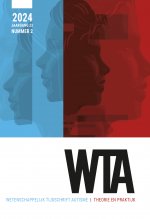
Zelfredzaamheid als uitgangspunt voor de begeleiding van ASS: een mythe
Productgroep WTA 2024-2Omschrijving
Levensloopbegeleiders vervullen een sleutelrol in het leven van mensen met autisme en zetten zich in om de levenskwaliteit van hun cliënten te bevorderen. Hierbij verenigen ze hun persoonlijke zorgvisie zo goed mogelijk met het systeem waarbinnen zij functioneren. Sinds de decentralisatie in 2015 hebben ze te maken met beleidsveranderingen binnen het sociale domein, waarbij de notie van zelfredzaamheid als uitgangspunt voor beleid wordt gehanteerd. Deze multi-interpretabele notie zorgt voor verwarring bij zowel mensen die afhankelijk zijn van zorg, als bij mensen die deze zorg verlenen, hetzij als mantelzorger, hetzij als professioneel zorgverlener. In deze bijdrage bespreek ik centrale kritieken op de notie van zelfredzaamheid, als beleidsuitgangspunt voor de begeleiding van mensen met autisme en welke alternatieve noties hierbij richtinggevend kunnen zijn.
SUMMARY
Life-course counsellors play a key role in the lives of people with autism and are committed to improving the quality of life of their clients. They combine their personal vision of care as best as possible with the system within they function. Since decentralization in 2015, they have had to deal with policy changes within the social domain, where the notion of self-reliance is used as a starting point for policy. This notion can be interpreted in many ways and causes confusion for people who are dependent on care and for people who provide this care, either as an informal caregiver or as a professional care provider. In this contribution I discuss the central criticisms on the notion of self-reliance as a policy starting point for the guidance of people with autism and which alternative notions could provide guidance.
